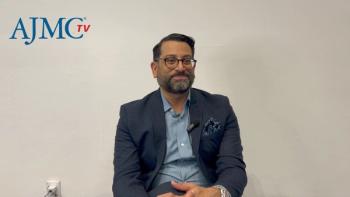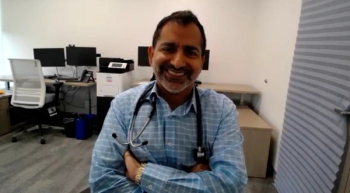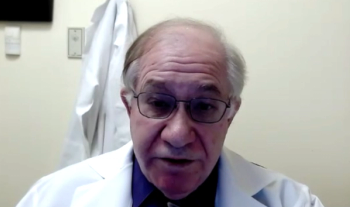
Mild asthma could be better treated with the recent approval of the combination of albuterol/budesonide.

Mild asthma could be better treated with the recent approval of the combination of albuterol/budesonide.

Lenacapavir works to both treat and prevent HIV, making it a promising drug should it be approved by the FDA later this month.

Developments in artificial intelligence (AI) can help clinicians to diagnose thoracic conditions that may be miss on first glance.

Dirk Arnold, MD, PhD, medical director, Asklepios Tumour Biology Centre, discusses a phase 3 clinical trial investigating amivantamab in metastatic colorectal cancer.

Jill Feldman, cofounder and president, EGFR Resisters, shares the importance of being proactive in managing dermatologic toxicities in epidermal growth factor receptor (EGFR)–positive lung cancer.

The value of the combination of albuterol/budesonide is high due to its alleviating of corticosteroid burden, according to Reynold Panettieri Jr, MD.

Danny Rischin, MD, medical oncologist, clinician researcher, Peter McCallum Cancer Centre, discusses a novel adjuvant treatment approach for patients with locally advanced cutaneous squamous cell carcinoma (CSCC).

Switching patients with chronic lymphocytic leukemia (CLL) from ibrutinib to zanubrutinib has led to fewer cardiac adverse effects and a reduced workload for Mohit Narang, MD, managing partner at Maryland Oncology Hematology.

The landscape of treatment for bronchiectasis could change significantly with the approval of brensocatib, offering a more direct method of stemming the adverse events related to the condition, explains James Chalmers, MD, University of Dundee.

Margrit Wiesendanger, MD, PhD, highlights how social determinants of health and equitable treatment access are critical to improving lupus outcomes, particularly in minority populations.

Ibrahim Aldoss, MD, associate professor, City of Hope, explores recent findings on ponatinib as a first-line treatment for Philadelphia chromosome–positive acute lymphoblastic leukemia (Ph+ ALL).

Different dosages of brensocatib proved effective in treating people living with bronchiectasis when studied in the ASPEN trial.

Vincent Picozzi, MD, medical oncologist and director of the Pancreaticobiliary Program at Virginia Mason, discusses findings from the PANOVA-3 trial, which represents a significant breakthrough in locally advanced pancreatic cancer (LA-PAC) treatment.

Manmeet Ahluwalia, MD, MBA, FASCO, chief of medical oncology, chief scientific officer, and deputy director of the Miami Cancer Institute of Baptist Health South Florida, discusses a groundbreaking clinical trial for non-small cell lung cancer (NSCLC) brain metastases.

Gary Falcetano, PA-C, AE-C, explained that chronic allergic inflammation can significantly affect brain chemistry and mood regulation.

Exploring caregiver dependence and social determinants of health reveals critical barriers to HIV care for children, impacting treatment adherence and access, explains Priscilla Tsondai, MD, MPH.

Pharmacists enhance value-based care by selecting cost-effective treatments, managing adherence, and preventing hospitalizations through collaborative multidisciplinary teamwork, said Eileen Peng, PharmD, of Astera Cancer Care.

Sanjay Goel, MD, MS, professor of medicine at Robert Wood Johnson Medical School and medical oncologist at Rutgers Cancer Institute, anticipates groundbreaking data at the American Society of Clinical Oncology (ASCO) 2025 meeting, with plenary sessions spotlighting research that could immediately impact cancer care.

The approval of brensocatib for use in patients with bronchiectasis could offer the first treatment directly addressing the roots of the condition.

Gary Falcetano, PA-C, AE-C, explains that spring allergies can contribute to spring-onset seasonal affective disorder, emphasizing the need for more research collaboration and for clinicians to address both physical and mental health in patients with allergies.

Lindsey Leininger, PhD, and Allister Chang, MPA, highlight the potential of laundromats as accessible, community-based settings to support Medicaid outreach, foster trust, and connect families with essential health and social services.

Victor Murray, MSW, of the Camden Coalition, delves into the evolving role of social workers, focusing on advocacy, systems change, and addressing health disparities in underserved communities.

Cathy Eng, MD, FACP, FASCO, Vanderbilt-Ingram Cancer Center, speaks about the clinical and operational priorities that academic medical centers make front-and-center when caring for underserved populations receiving treatment for cancer.

As community oncology evolves to deliver chimeric antigen receptor (CAR) T and bispecific therapies closer to home, support is needed to ensure patient access and precision medicine capabilities, says Nini Wu, MD.

Jonathan Strober, MD, explains the initial presentation of myasthenia gravis in a pediatric patient population and why initial diagnosis for these patients can be challenging.

Pharmacists play a crucial role in managing treatment with chimeric antigen receptor T-cell therapy and bispecific antibodies, focusing on patient selection and side effects, explained Eileen Peng, PharmD, of Astera Cancer Care.

Gastropsychiatrist Eva Szigethy, MD, PhD, and Benjamin Cohen, MD, Cleveland Clinic, discuss quality of life improvement in terms of behavioral health and inflammatory bowel disease (IBD).

Attendees at the American Thoracic Society (ATS) 2025 International Conference highlight global networking, scientific advancements, and professional development at this year's meeting.


Gerard Criner, MD, FACP, FACCP, MATINEE investigator, highlights trial results that showed reduced exacerbations and delayed disease progression in patients with eosinophilic chronic obstructive pulmonary disease (COPD).

259 Prospect Plains Rd, Bldg H
Cranbury, NJ 08512
© 2025 MJH Life Sciences®
All rights reserved.
